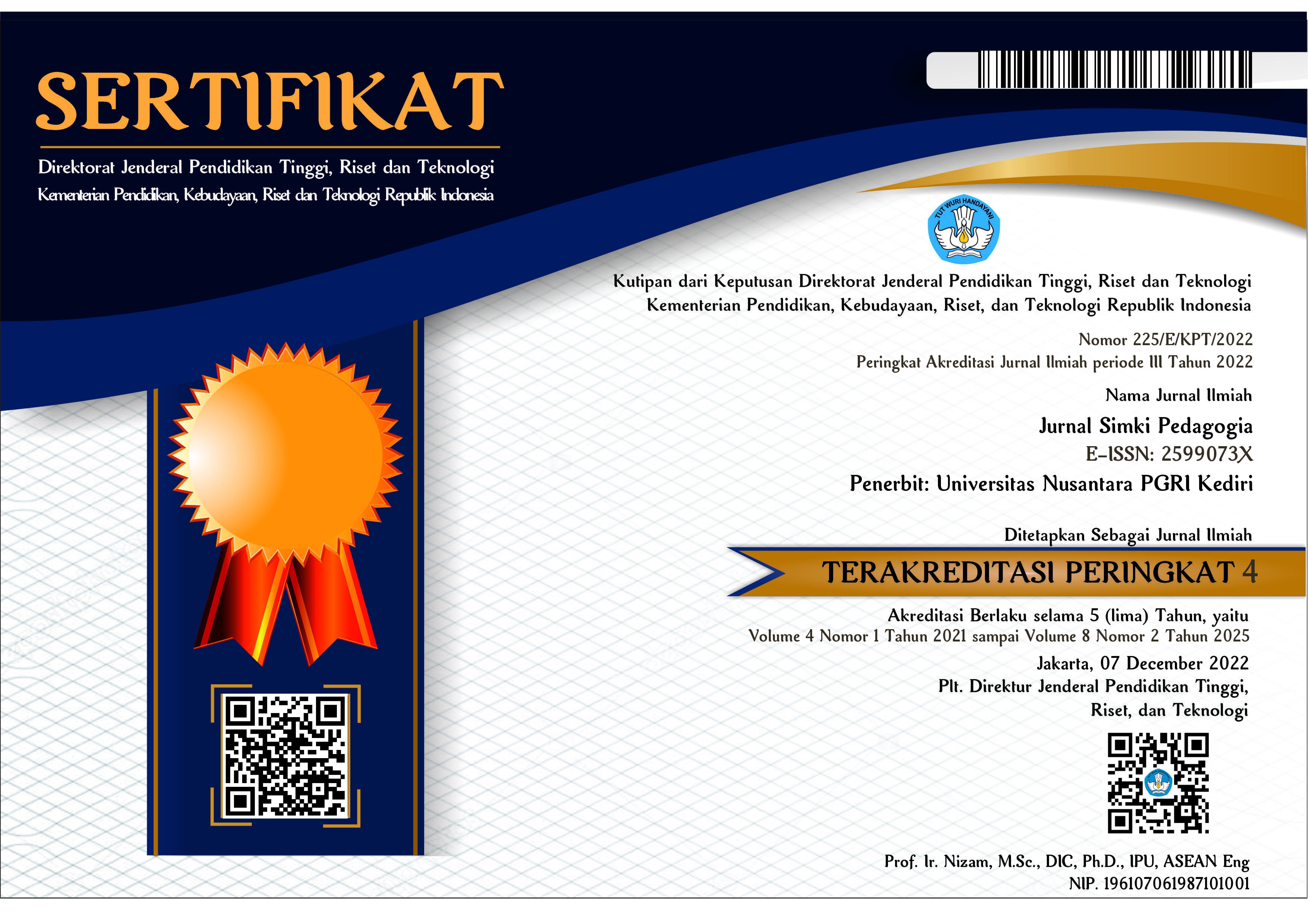Evaluasi Peran Pendidikan Agama Islam dalam Meningkatkan Sikap Profesional dan Etika Kerja Mahasiswa Teknik Alat Berat di Akademi Komunitas Olat Maras Sumbawa
 Abstract views: 213
,
Abstract views: 213
,
 PDF (Bahasa Indonesia) downloads: 100
PDF (Bahasa Indonesia) downloads: 100
Abstract
This study aims to examine the role of Islamic religious education in improving the professional attitude and work ethic of Heavy Equipment Engineering students at the Olat Maras Sumbawa Community Academy. The method used is descriptive qualitative research with field studies, which include in-depth interviews, observations and documentary studies as data collection techniques. Data were analyzed inductively through data reduction, data presentation and verification to gain a deep understanding of the impact of Islamic religious education on students' professional attitudes and work ethic. The results of the study indicate that Islamic religious education is very helpful in shaping students' discipline, responsibility and integrity. However, there is a gap between the understanding of religious values and their implementation in real work practices, so that a more applicable and contextual learning method is needed. These findings provide recommendations for the development of curriculum and learning methods that integrate religious values with the demands of heavy equipment engineering work life. This study makes an important contribution to the development of Islamic religious education within the framework of professional engineering education.
Downloads
References
Aflah, K. N., Suharmono, S., Mas’ud, F., & Mursid, A. (2021). Islamic Work Ethics and Employee Performance: The Role of Islamic Motivation, Affective Commitment, and Job Satisfaction. Journal of Asian Finance, Economics and Business, 8(1), 997–1007. https://doi.org/10.13106/jafeb.2021.vol8.no1.997
Ahmad, S., & Yusuf Owoyemi, M. (2012). The Concept of Islamic Work Ethic: An Analysis of Some Salient Points in the Prophetic Tradition. International Journal of Business and Social Science, 3(20), 116.
Anwar, S., & Salim, A. (2019). Pendidikan Islam dalam Membangun Karakter Bangsa di Era Milenial. Al-Tadzkiyyah: Jurnal Pendidikan Islam, 9(2), 233. https://doi.org/10.24042/atjpi.v9i2.3628
Hambali, D. S., & Asyafah, A. (2020). Implementasi pembelajaran pendidikan agama islam di pendidikan tinggi vokasi. Jurnal Kajian Pendidikan Umum, 18(2), 8–19. https://doi.org/10.17509/sosio-religi.v18i2.28727
Hasan, R. (2022). DI PERGURUAN TINGGI VOKASI (Studi Kasus di AKN Aceh Barat). 4, 76–84.
Mindani. (2022). Evaluasi Pembelajaran Pendidikan Agama Islam (PAI). In Angewandte Chemie International Edition, 6(11), 951–952. http://repository.iainbengkulu.ac.id/11040
Munawaroh, N., & I Ijudin. (2022). Pendidikan Agama Islam dan budi pekerti untuk siswa kelas X SMA/SMK. https://digilib.uinsgd.ac.id/64483/
Putu, N., Parwati, Y., & Pramartha, N. B. (2021). Strategi Guru Sejarah Dalam Menghadapi Tantangan Pendidikan Indonesia Di Era Society 5.0. Widyadari, 22(1), 143–158. https://doi.org/10.5281/zenodo.4661256
Ramadhan, B. M., & Hadi Ryandono, M. N. (2015). Etos Kerja Islami Pada Kinerja Bisnis Pedagang Muslim Pasar Besar Kota Madiun. Jurnal Ekonomi Syariah Teori dan Terapan, 2(4), 274. https://doi.org/10.20473/vol2iss20154pp274-287
Rijal Fadli, M. (2021). Memahami desain metode penelitian kualitatif. 21(1), 33–54. https://doi.org/10.21831/hum.v21i1
Sajadi, D. (2019). Pendidikan Karakter Dalam Perspektif Islam. Tahdzib Al-Akhlaq: Jurnal Pendidikan Islam, 2(2), 16–34. https://doi.org/10.34005/tahdzib.v2i2.510
Saragih, R. A., & Dianto, D. (2023). Pengaruh Pendidikan Agama Islam terhadap Sikap Sosial Siswa di SMP IT Al Jawahir. Journal of Education Research, 4(4), 2025–2033. https://doi.org/10.37985/jer.v4i4.643
Solichin, M. M. (2007). Pengembangan Evaluasi Pendidikan Agama Islam Berbasis Ranah Afektif. Tadris, 2, 76–91. https://doi.org/10.19105/tjpi.v2i1.210
Solihin, I., Hasanah, A., & Fajrussalam, H. (2020). Core Ethical Values of Character Education Based on Islamic Values in Islamic Boarding Schools. International Journal on Advanced Science, Education, and Religion, 3(2), 21–33. https://doi.org/10.33648/ijoaser.v3i2.51
Sugiono. (2016). Metode Pendekatan Kuantitatif, kualitatif dan R&D. In Bandung: Alfabeta.
Ulya, A., & Sassi, K. (2024). Komparasi Kebijakan Kurikulum Pendidikan Agama Islam Di Indonesia Dan Thailand. Jurnal Lentera Pendidikan Pusat Penelitian Lppm Um Metro, 9(2), 355. https://doi.org/10.24127/jlpp.v9i2.3727
Wahidmurni. (2017). Pemaparan Metode Penelitian Kualitatif. 1–14.
Copyright (c) 2025 Ovi Soviya, Lina Eta Safitri, Novitasari

This work is licensed under a Creative Commons Attribution 4.0 International License.

Jurnal Simki Pedagogia : https://jiped.org/index.php/JSP/index is licensed under a Creative Commons Attribution 4.0 International License.
















